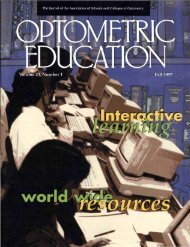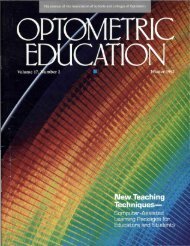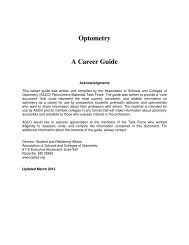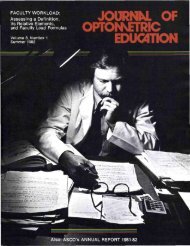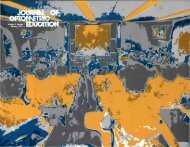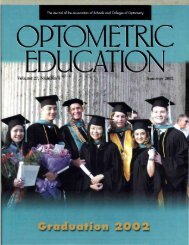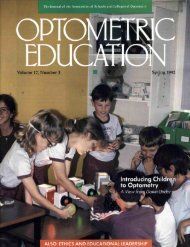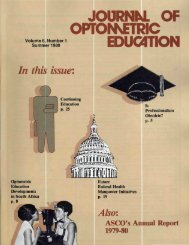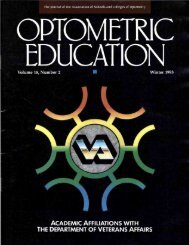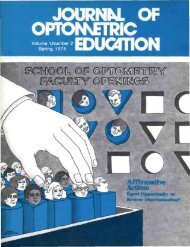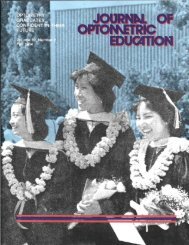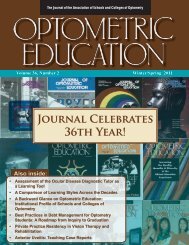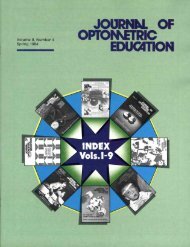Summer 2012, Volume 37, Number 3 - Association of Schools and ...
Summer 2012, Volume 37, Number 3 - Association of Schools and ...
Summer 2012, Volume 37, Number 3 - Association of Schools and ...
You also want an ePaper? Increase the reach of your titles
YUMPU automatically turns print PDFs into web optimized ePapers that Google loves.
such as in optometric procedures or<br />
methods courses, we do not usually expect<br />
that all students will reach mastery<br />
at each assessment. We may recheck as<br />
many areas as we can on the final <strong>and</strong><br />
National Board exams, but because every<br />
student is not required to get an “A,”<br />
this still leaves something to be desired.<br />
In Khan Academy courses, “masterybased<br />
learning” means students must<br />
get 10 questions in a row correct to<br />
move on to the next lesson. 4 When they<br />
do not, they continue to practice the<br />
muddy points until they clear up, in<br />
much the same way optometric procedures<br />
or methods courses are taught.<br />
How do optometric educators know<br />
when their students need assistance?<br />
Too <strong>of</strong>ten, students don’t know enough<br />
to ask. How many <strong>of</strong> us have sat<br />
through empty <strong>of</strong>fice hours the day<br />
before an exam without seeing a single<br />
student because they were studying<br />
for the exam <strong>and</strong> did not know which<br />
questions to ask?<br />
For Khan Academy, the answer is the<br />
teacher’s dashboard. Performancemeasuring<br />
apps, long-used <strong>and</strong> old hat<br />
in the financial sector from which Sal<br />
Khan came, are novel to educators at all<br />
levels. Perhaps some have seen real-time<br />
test results roll in on learning management<br />
s<strong>of</strong>tware like Blackboard or Moodle.<br />
Using a tablet or other portable<br />
interface, the instructor can circulate<br />
around the classroom <strong>and</strong> know exactly<br />
where each student may be excelling —<br />
or struggling.<br />
All too <strong>of</strong>ten, optometric educators may<br />
find mathematics is the area <strong>of</strong> difficulty,<br />
which is the topic <strong>of</strong> the next principle.<br />
Principle #5: Math is a<br />
Stumbling Block for Many<br />
Students Today<br />
<strong>Schools</strong> <strong>and</strong> colleges <strong>of</strong> optometry face<br />
a challenge <strong>of</strong> homogeneity. Most incoming<br />
students, as high as 85%, were<br />
biology majors as undergraduates. The<br />
reasons for this are obvious when the<br />
prerequisites <strong>of</strong> optometry school are<br />
compared with those for various undergraduate<br />
majors.<br />
For all the strengths <strong>of</strong> the average biology<br />
major in ocular anatomy, physiology<br />
<strong>and</strong> disease, as a rule, mathematics is not<br />
the strong suit. Fortunately, the Khan<br />
Academy techniques are most easily applied<br />
to very concrete subjects like mathematics,<br />
including optics. 3 In fact, most<br />
<strong>of</strong> the existing 3,100 Khan Academy<br />
videos on topics <strong>of</strong> interest to optometry<br />
students are currently in optics.<br />
For most students who struggle, the<br />
problem in American education in<br />
mathematics certainly precedes optometry<br />
school. Many intelligent students<br />
may not have ever been required to attain<br />
mastery in basic arithmetic, algebra<br />
or trigonometry. While the prevalence<br />
<strong>of</strong> mathematical illiteracy in American<br />
society is on the rise, there is some disagreement<br />
as to the reason. Some blame<br />
the use <strong>of</strong> calculators from an early age.<br />
Others blame the use <strong>of</strong> manipulatives<br />
like geoboards instead <strong>of</strong> paper-<strong>and</strong>pencil<br />
exercises.<br />
Whatever the cause, it is not the sole<br />
duty <strong>of</strong> optometric educators to bring<br />
about a mathematical renaissance. However,<br />
if we wish our interns to be able to<br />
quickly calculate a net add or conversions<br />
from plus to minus cylinder, drills<br />
to practice these conversions should be<br />
done until the student attains mastery.<br />
Principle #6: Be a Guide<br />
on the Side, Not a Sage on<br />
the Stage<br />
This catchphrase <strong>of</strong> the flipped classroom<br />
movement has been around in<br />
educational circles since at least the<br />
1990s. 6 Pragmatists can legitimately<br />
point out that it is a nice sentiment,<br />
but may be much easier to say than to<br />
implement. Proponents will admit it<br />
is easier for educators to imagine constructing<br />
new courses in the flipped<br />
classroom format than to imagine converting<br />
pre-existing st<strong>and</strong>ard lectures.<br />
While some topics in optometric education<br />
may lend themselves to this format<br />
better than others, with preparation <strong>of</strong><br />
micro lectures <strong>and</strong> practice problems,<br />
the flipped classroom will come to life.<br />
Personally, I plan to attempt some version<br />
<strong>of</strong> these techniques in my 40-student<br />
elective this summer. The long<br />
nights <strong>of</strong> the warmer months may lend<br />
themselves to both creating <strong>and</strong> listening<br />
to micro lectures, while the smaller<br />
class size (for us) may work better for<br />
me to be a guide on the side.<br />
In the words <strong>of</strong> Bill Gates at the end<br />
<strong>of</strong> the Technology, Education <strong>and</strong> Design<br />
(TED) lecture by Salman Khan: “I<br />
think you’ve just got a glimpse <strong>of</strong> the<br />
future <strong>of</strong> education.” 1<br />
References<br />
1. TED: Ideas Worth Spreading [Internet].<br />
Talk by Salman Khan.<br />
Accessed 15 May <strong>2012</strong>. Available<br />
from: http://www.ted.com/talks/<br />
salman_khan_let_s_use_video_<br />
to_reinvent_education.html.<br />
2. Khan Academy [Internet]. Assessed<br />
15 May <strong>2012</strong>. Available from:<br />
www.khanacademy.org.<br />
3. Wikipedia. Khan Academy [Internet].<br />
Accessed 15 May <strong>2012</strong>. Available<br />
from: http://en.wikipedia.org/<br />
wiki/Khan_Academy.<br />
4. Thompson C. How Khan Academy<br />
is changing the rules <strong>of</strong> education.<br />
Wired magazine [Internet].<br />
Assessed 15 May <strong>2012</strong>. Available<br />
from: http://www.wired.com/magazine/2011/07/ff_khan/all/1.<br />
5. Khan Academy: the future <strong>of</strong> education?<br />
Excerpt from 60 Minutes<br />
interview. YouTube [Internet].<br />
Assessed 15 May <strong>2012</strong>. Available<br />
from: http://www.youtube.com/<br />
watch?v=zxJgPHM5NYI#t=62s.<br />
6. Wikipedia. Flip teaching [Internet].<br />
Accessed 15 May <strong>2012</strong>. Available<br />
from: http://en.wikipedia.org/<br />
wiki/Flip_teaching.<br />
Optometric Education 106 <strong>Volume</strong> <strong>37</strong>, <strong>Number</strong> 3 / <strong>Summer</strong> <strong>2012</strong>



